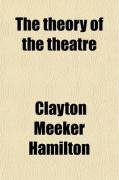The Theory of the Theatre

Purchase of this book includes free trial access to www.million-books.com where you can read more than a million books for free. This is an OCR edition with typos. Excerpt from book: Ill THE ACTOR AND THE DRAMATIST We have already agreed that the dramatist works ever under the sway of three influences which are not felt by exclusively literary artists like the poet and the novelist. The physical conditions of the theatre in any age affect to a great extent the form and structure of the drama; the conscious or unconscious demands of the audience, as we have observed in the preceding chapter, determine for the dramatist the themes he shall portray; and the range or restrictions of his actors have an immediate effect upon the dramatist's great task of character-creation. In fact, so potent is the influence of the actor upon the dramatist that the latter, in creating character, goes to work very differently from his literary fellow-artists, the novelist, the story-writer, or the poet. Great characters in non-dramatic fiction have often resulted from abstract imagining, without direct reference to any actual person: Don Quixote, Tito Melema, Leatherstocking, sprang full-grown from their creators' minds and struck the world as strange and new. But the greatest characters in the dramahave almost always taken on the physical, and to a great extent the mental, characteristics of certain great actors for whom they have been fashioned. Cyrano is not merely Cyrano, but also Coquelin; Mascarille is not merely Mascarille, but also Mo- liere; Hamlet is not merely Hamlet, but also Richard Burbage. Closet-students of the plays of Sophocles may miss a point or two if they fail to consider that the dramatist prepared the part of CEdipus in three successive dramas for a certain star-performer on the stage of Dionysus. The greatest dramatists have built their plays not so much for reading in the closet as for immediate presentation on the stage; they have grown to greatness...
Info about the book
Author:
Series:
Unknown
ASIN:
B003YH9ZMU
Rating:
4.5/5 (3)Your rating:
0/5
Languge:
English
Users who have this book
Users who want this book
What readers are saying
What do you think? Write your own comment on this book!
write a commentif you like The Theory of the Theatre try:
Do you want to exchange books? It’s EASY!
Get registered and find other users who want to give their favourite books to good hands!







